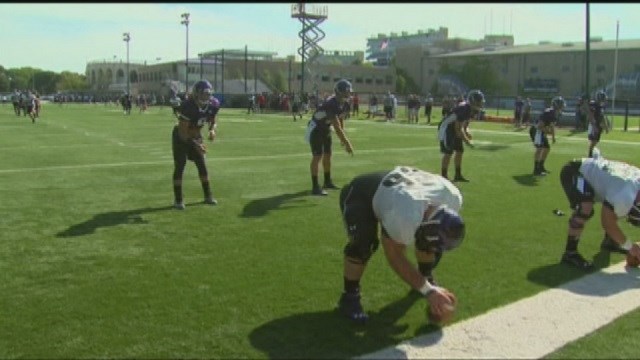-
Tips for becoming a good boxer - November 6, 2020
-
7 expert tips for making your hens night a memorable one - November 6, 2020
-
5 reasons to host your Christmas party on a cruise boat - November 6, 2020
-
What to do when you’re charged with a crime - November 6, 2020
-
Should you get one or multiple dogs? Here’s all you need to know - November 3, 2020
-
A Guide: How to Build Your Very Own Magic Mirror - February 14, 2019
-
Our Top Inspirational Baseball Stars - November 24, 2018
-
Five Tech Tools That Will Help You Turn Your Blog into a Business - November 24, 2018
-
How to Indulge on Vacation without Expanding Your Waist - November 9, 2018
-
5 Strategies for Businesses to Appeal to Today’s Increasingly Mobile-Crazed Customers - November 9, 2018
Northwestern football players can’t unionize, says National Labor Relations Board
“The fact that the scholarship players are students who are also athletes receiving a scholarship to participate in what has traditionally been regarded as an extracurricular activity (albeit a nationally prominent and extraordinarily lucrative one for many universities, conferences, and the NCAA) materially sets them apart from the Board’s student precedent….” Considering the vast sums of money in collegiate athletics, particularly football, the players argued that they should be afforded better protections – specifically in the form of long-term health care, increased scholarships, and a trust fund players could access to finish their degrees once their eligibility had expired. The losing side does not have an option to appeal.
Advertisement
In a statement Monday, the NLRB said the five-member board did not determine whether players are “statutory employees” under the National Labor Relations Act. “Both locally at Northwestern, and broadly as chairman of the NCAA Division I Council, it has been remarkable over the last several years to witness the rapid evolution of college athletics with student-athlete well-being as the top priority”. “The NCAA and its member schools are committed to providing the best support possible for all college athletes and will continue to do so in the future”.
At first glance, the lack of a decision that led to the dismissal of the Northwestern football players’ union petition could be seen as a total and utter victory for the NCAA and its burning desire to maintain the status quo. Their petition was approved by the Chicago regional chapter of the NLRB in March of last year – a decision that was disputed by the university. Quarterback Kain Colter appeared at a news conference for the College Athletes Players Association, flanked by leaders of the United Steelworkers union, which lent its organizing expertise and presumably helped bankroll the union drive.
The NLRB regional director who handled the case noted that Northwestern football players each receive scholarship assistance worth about $61,000 per year, and in exchange spend 40 to 50 hours a week during the regular season practicing, playing and traveling to games.
CAPA president Ramogi Kuma called Monday’s ruling a “loss in time” in a statement, in that it delayed “the leverage the players need to protect themselves”. There was a vote taken in April 2014, but the school appealed before the ballots were counted and they were impounded.
Northwestern University football players believed they had a right to form a union on campus, much to the anger and embarrassment of school officials and the NCAA, college sports’ governing body. “While this is a setback for the unionization efforts… there are other ways for student-athletes to improve their rights”.
College football players have all the skills but no power.
While NLRB decisions sometimes split along party lines, the three Democrats and two Republicans on the board all agreed. But the NCAA’s stranglehold on college athletes and their schools is beginning to loosen.
Advertisement
“If they make inroads in one state, it’s conceivable others would follow”, he said. That means the door has not been shut on the prospect of other college athletes being allowed to unionize.





























